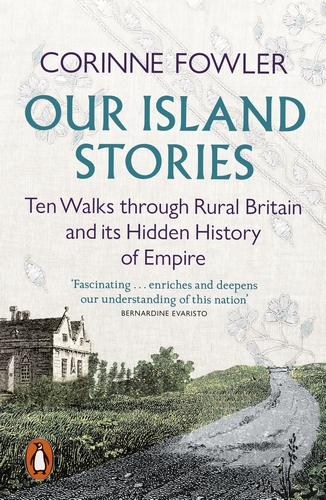Fowler unearths the hidden legacies of slavery, capitalism and exploitation that make up contemporary British relationships with the countryside

Corinne Fowler | Our Island Stories: Ten Walks through Rural Britain and its Hidden History of Empire | Penguin Random House: £10.99
Reviewed by Paul Anthony Knowles
Our Island Stories, Corrine Fowler’s follow-up to Green Unpleasant Land (2020), goes further in uncovering the personal connections that ten people — from the worlds of politics, art, academia, photography and literature — have to rural Britain’s colonial past. Fowler sets out on ten walks across Britain’s countryside uncovering how the nation’s collective love for picturesque, pastoral landscapes hides the exploitation and human suffering behind the formation of our treasured ‘green and pleasant’ land and its iconic country houses. Fowler’s extensive research and observations in the ten walks uncover how the exploitation of enslaved people, the establishment of the Dutch West Indian Company and the East Indian Company, and the slave trade routes between the UK, the Americas and Africa are the forgotten legacies behind Britain’s rural wealth. This was what provided the vast quantities of raw materials needed to power the Industrial Revolution, as Fowler discuss on her visit to cotton mills of Darwen that were dependent on American and Indian cotton.
Each of Fowler’s ten walks focuses on a specific way in which people and landscapes were exploited through colonialism. Fowler’s walks include, but are not limited to, ‘The Cotton Walk: East Lancashire’; ‘The Sugar Walk: Jura and Islay’; ‘The Enclosure Walk: Norfolk and Jamaica’; ‘The Copper Walk; Cornwall, West Africa and the Americas’. For each walk, Fowler is joined by a companion who has a personal family connection to the landscape, from Graham Campbell, the SNP’s first Caribbean heritage councillor, to the writer Louisa Adjoa Parker, who is the child of a Ghanian father and English Mother.
Fowler’s depth of knowledge and research throughout Our Island Stories is highly impressive. From her charting the lives of the two brothers John and Charles Cockerell during her ‘Indian Walk’ in the Cotswolds and how both brothers played integral but different roles in The East Indian company’s exploitation and dismantling of India. Both brothers generated vast personal wealth through their exploits allowing them to build country estates back in the Cotswolds and influence local politics, to explaining on her ‘Enclosure Walk’, that the enclosure policies formed in the management of the Caribbean plantations were brought back by plantation owners. After they had accrued enormous personal wealth from the exploitation of enslaved people, they applied similar techniques to the estates they built in Norfolk, lobbying parliament to enclose the countryside against Norfolk’s rural communities, turning the commons into private hunting estates.
The poignancy of Fowler’s second book is created through the personal connections and reflections her fellow walkers have to the landscape. It is these personal connections and family histories tied into the land that bring to life the vastness of the colonial system that is rooted in every facet of modern-day-life, which the majority of us are ignorant of or find hard to confront. Three powerful examples of the ways in which colonialism reverberates in the personal everyday lives of Fowler’s companions can firstly be found in Graham Campbell’s personal connection to Finlaggan (an ancestral family seat of the Campbells on Jura before the clearance of crofters). This strand of his family history is intertwined with his inability to find out historical records of his Caribbean family history due to the renaming of enslaved people as Campbell. Secondly, in artist Bharti Parmar’s connection to the cotton mills of Lancashire which her father worked in when he first emigrated from India. Parmar’s pride towards her father is evident through the fabric artwork she is producing, but she also feels pride when she learns about Gandhi’s visit to Darwen to explain the importance of the Swadeshi movement and the sorrow he feels at it causing harm to the lives of the mill workers. Finally, in Raj Pal recounting to Fowler that there was no mention of the Indian Soldiers in the Belgium war museums he visited with his son, which meant that they both felt that the sacrifices his family made to fight for the British Empire in both World Wars had been erased through a lack of remembrance.
Our Island Stories is an impressive feat of academic research as it uncovers the vastness of the colonial systems of exploitation and power that created the wealth behind the British Empire. What turns Fowler’s Our Island Stories from impressive academic research into a compassionate, moving, and unflinching reflection on the lasting legacy of colonialism are the personal reflections of her fellow walkers, and how they fight to carve out a space of belonging in what is still a traditional White-British space. Fowler’s book is essential reading in our current politics of division, fear, and vile inflammatory rhetoric excluding people who do not fit into increasingly narrow definitions of Britishness. Fowler’s book offers us an antidote to the poison of political division by exemplifying how open, honest and respectful conversations between people from different communities, heritages, and backgrounds can lead to greater understanding of our collective past. It is through such methods we can foster new friendships for the future built on mutual respect.
Reviewed by Paul Anthony Knowles
